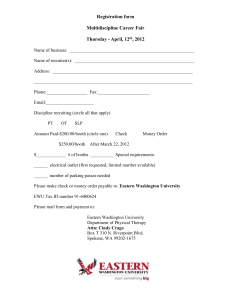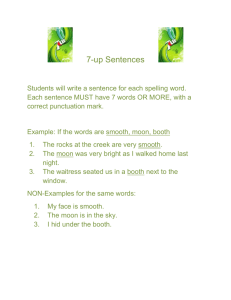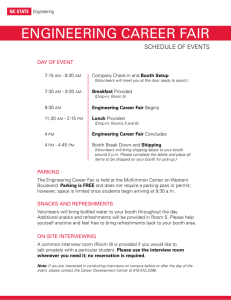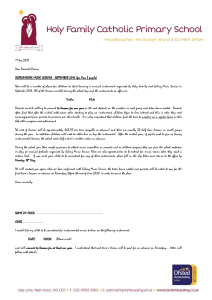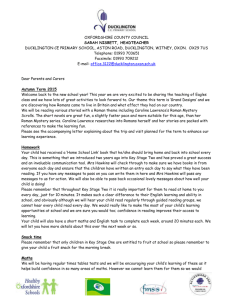Violin Program Proposal Rising Stars Christian Academy 3115
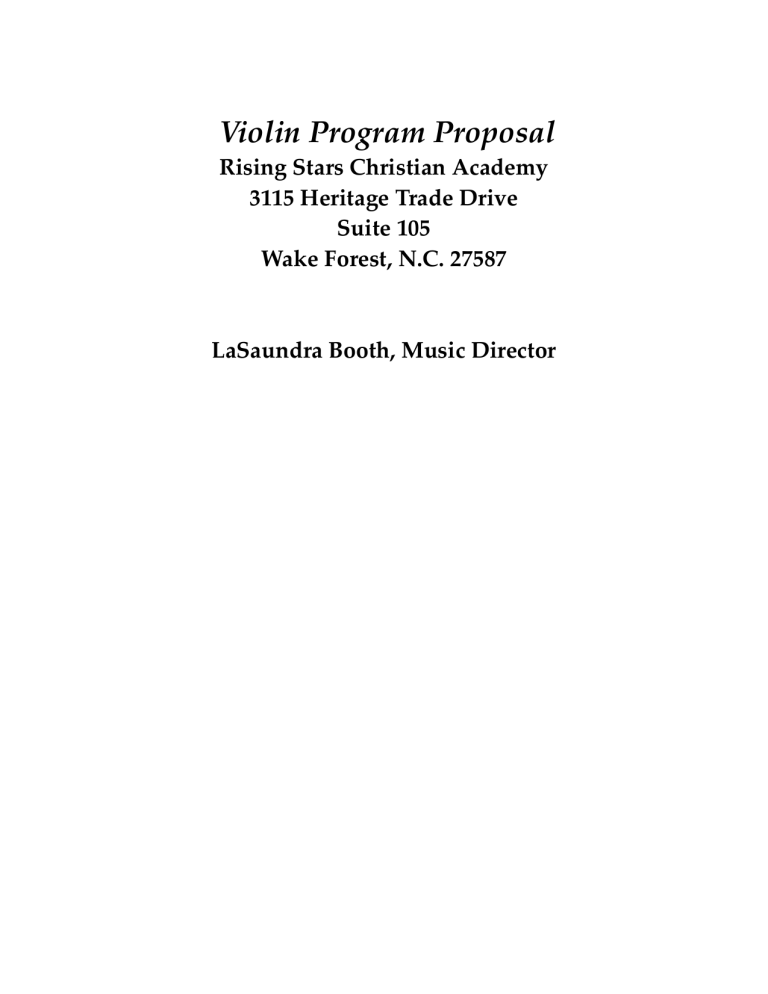
Violin Program Proposal
Rising Stars Christian Academy
3115 Heritage Trade Drive
Suite 105
Wake Forest, N.C. 27587
LaSaundra Booth, Music Director
Purpose Statement…………….……………..…………….…..……........3
Mission Statement….……………………………………….………........4
RSCA Violin Program Curriculum Goals………………......……....…5
Curriculum Goal Strategies………………………….…….…….........…8
RSCA Violin Program Handbook…..…………..….. ……………......11
Instructor Information….………………………..………………............13
Instructor Resume……………………………………..……..…………...14
The purpose of the RSCA Violin Program is to enrich the academic experience of its participants through a systematic pedagogical approach to instrumental technique, and instrumental care and maintenance.
In addition to pitch discrimination, note reading, and other music fundamentals, participants will be able to transfer the knowledge obtained from their ensemble experiences to other academic disciplines.
In alignment with the mission of Rising Stars Christian Academy, the mission of the RSCA Violin Program is to use instrumental music as a vehicle to discover, develop, and nurture each participant’s
God-given talent, and to promote meaningful learning experiences that enable students to explore the culturally diverse world around them and beyond.
The curriculum goals listed below are specific competency goals within The North
Carolina Essential Standards that will be implemented throughout the course of instruction. Participants will demonstrate mastery of the following standards:
Music Literacy:
6.ML.1 Apply the elements of music and musical techniques in order to play music with accuracy and expression.
7.ML.2: Interpret the sound and symbol systems of music.
8.ML.3: Create music using a variety of sound and notational sources.
Musical Response:
6.MR.1: Understand the interacting elements to respond to music and music performances
7.MR.1.2: Execute specific gestures of a conductor in response to various elements of music (such as meter, dynamics, phrasing, etc.)
8.MR1.3: Evaluate the quality and effectiveness of performances, compositions, arrangements, and improvisations by applying specific criteria appropriate for the style of the music.
Contextual Relevancy:
6.CR.1: Understand global interdisciplinary, and 21 st century connections with music.
7.CR.1.2: Understand the relationships between music and concepts from other areas.
8.ML.1.3: Understand the functions music serves, roles of musicians, and conditions under which music is typically performed.
Music Literacy:
6.ML.1 Apply the elements of music and musical techniques in order to play
music with accuracy and expression. que, musicianship, and instrumental maintenance for each instrumental discipline. technical practices, the fundamentals of music theory, and an exposure of music history dating from the Baroque Period to the music of the Twenty-first century. discipline by performing one composition from memory in a formal recital.
7.ML.2: Interpret the sound and symbol systems of music. beginning string pedagogical methods to introduce the fundamentals of music theory. demonstrate mastery knowledge of musical symbols including: quarter notes, staff, treble clef, bass clef, half note, whole note, eighth note, breath mark, time signature, bar line, measure, and up and down bow symbols.
8.ML.3: Create music using a variety of sound and notational sources. chord, sub-dominant, and dominant chords within a variety of keys and melodies including Old McDonald, and Twinkle, Twinkle, Little Star.
composition during the course. course and perform compositions in class, as well as in a formal performance on the last day of camp.
Musical Response:
6.MR.1: Understand the interacting elements to respond to music and music
performances tening activities that will develop students’ ability to recognize and correctly pitch on instruments, as well as learn to adjust to the intonation of others while performing in an ensemble. sic in order to compare and contrast compositional techniques and instrumental timbres.
7.MR.1.2: Execute specific gestures of a conductor in response to various
elements of music (such as meter, dynamics, phrasing, etc.) ecipher conductor cues specifically in reference to changes in dynamics, tempo, and phrasing through daily activities, and customized learning sequences.
8.MR1.3: Evaluate the quality and effectiveness of performances, compositions, arrangements, and improvisations by applying specific criteria
appropriate for the style of the music. arrangements. l, and group performances.
Contextual Relevancy:
6.CR.1: Understand global, interdisciplinary, and 21 st
century connections with
music. gospel, modern rock, country, classical, and baroque in which they will be given an opportunity to discover how and why these musical forms originated as well as their importance to American culture. world around them through classroom journal assignments and/or discussions.
7.CR.1.2: Understand the relationships between music and concepts from other
areas. of other content areas. and match pitch vocally and on instruments throughout the instructional period. compositions.
8.ML.1.3: Understand the functions music serves, roles of musicians, and
conditions under which music is typically performed. music (i.e: accompaniment, melody, harmony, pedal tone, and/or drone) and presentation of the arts.
Requirements: The RSCA Violin Program shall accept participants ages three to eighteen years old with a signed parental consent form. acknowledgement of the responsibilities required to obtain and continue instruction.
As participants are under eighteen years of age, a signature of the parent(s)/ guardian must accompany the participant’s signature.
Each participant is responsible for the purchase/rental and maintenance of
his/her instrument. In addition, participants are responsible for purchasing all required instrumental accessories including the following: rosin, shoulder rest, and the Essential Elements 2000 technique book.
Cost: The cost is $22 per week, per participant.
-five minutes of group instruction, at one day per week in violin studies. Lessons will be given on location at:
Rising Stars Christian Academy
3115 Heritage Trade Drive
Suite 105
Wake Forest, N.C. 27587
Time: It is therefore important to note that all participants must be on time to each lesson. As emergencies do arise, it is important to contact the instructor as soon as possible in any event. Since lessons are only once per week, excessive tardiness and unexcused absences hinder the participant’s ability to receive consistent instruction, and is grounds for dismissal from the program.
Practice: Practice is essential to the development of correct technique, a healthy attitude towards string playing, and is crucial to the successful progression of fine and gross motor pitch recognition of every participant. Instrumental practice shall be required during the week prior to each orchestral session. A practice log shall be issued to all participants, which must be signed daily by his/her parent(s) or guardian to ensure maximum success within his/ her instrumental discipline. memory, in a formal recital. Recital dates will be determined after all participants have successfully demonstrated basic technical maturity within their instrumental discipline. All recitals will occur on location at Rising Stars Christian Academy.
LaSaundra L. Booth
Mrs. Booth is a professional cellist, and has over twenty-one years of performance experience. She is also a licensed Music Educator in the state of North Carolina.
Mrs. Booth received her bachelor's degree in Music with a concentration in Cello
Performance from North Carolina Central University. She studied with accomplished cellist, Dr. Timothy Holley. Mrs. Booth also received a Master's
Degree in Music Education with a concentration in String Pedagogy from the
University of North Carolina at Greensboro where she studied privately with cellist,
Dr. Alexander Ezerman. In addition to her Master's Degree, Mrs. Booth received advanced Master's licensure in Music Education. Mrs. Booth is currently pursuing a
Doctor of Education with a concentration in Educational Leadership. She currently teaches orchestra and chorus in Wake County Public Schools.
In addition to teaching privately, Mrs. Booth enjoys playing for weddings and special events. She was seen as the cellist on a television episode of the WB’s "One
Tree Hill, " and has also been the featured cellist on WRAL’s Spiritual Awakenings.
Mrs. Booth has developed string programs for public, charter, and private schools.
She has also developed curriculum for school music programs and music organizations including KidZNotes, an El Sistema inspired non-profit organization.
Mrs. Booth was placed on the Spring 2008 cover of Opus magazine, the official magazine of the North Carolina Symphony. She was featured for her commitment to establishing string programs for under served youth in the Durham area. Mrs. Booth served as violin instructor, and Mozart Orchestra Director for KidZNotes, an el
Sistema inspired program that teaches students from Pre-K to sixth grade how to play the violin.
Mrs. Booth has a passion for teaching, and takes pride in being able to nurture the gifts within others. Mrs. Booth gives God the glory for all of the talents that He has instilled in her.
LaSaundra L. Booth
Objective: To obtain the position as the Strings Instructor at Rising Stars Christian
Academy
Education:
North Central University, Prescott Valley, Arizona
Doctor of Education, Pending May 2016
Concentration: Educational Leadership
University of North Carolina at Greensboro, Greensboro, NC
Master of Music in Education, August 2009
Concentration: String Pedagogy, with Advanced Master’s Licensure
North Carolina Central University, Durham, NC
Bachelor of Arts, Music Liberal Arts, May 2003
Concentration: Instrumental Performance, Cello
Experience:
August 2010- Present
Wake Forest Middle School, Wake Forest, NC
September 2010-July 2013
KidZNotes, Durham, NC
Music Director and Conductor for Mozart Orchestra
-risk and underserved K-3 grade students
August 2006- Present
Integrity Strings, Durham, NC
August 2009- June 2010
Burton and C.C. Spaulding Elementary Schools, Durham, NC
-A funds
-appropriate lesson plans targeting multiple intelligences.
-wide arts events
January 2007- June 2008
Eastway Elementary School, Durham, NC
- and fifth-grade students.
Carolina Symphony.
Advisory Committee. and Technology).
August 2003-December 2006
Healthy Start Academy, K-8 Public Charter School, Durham, NC rriculum for grades K-8 based on the NC
Standard Course of Study.
Developed piano curriculum for 6 th
-8 th grade students.
Supervised 6 th and 8 th grade Dance Ensembles. hool music program
-grade students
October 2004– June 2008
Infuzion Studios, LLC, Durham, NC m for children and adults enrolled in lessons.
September 2003- November 2006
Community Music School, Raleigh, NC technique. sponsors.
Achievements:
Founder of Integrity Strings, a registered music booking agency
-2011 National Board Certification Candidate (Early/Middle Childhood Music
Education)
Featured article and cover story in April 2008 issue of Opus magazine.
Instruction Music Education License (K-12)
Master’s Licensure Music Education (K-12)
Skills:
- 2010 otivate students and colleagues to excel and strive for excellence ent in Finale music composition software
